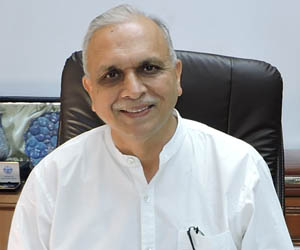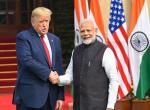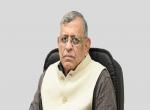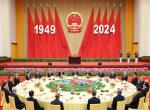In 2015, Prime Minister Modi and Prime Minister Abe of Japan had mooted a unique idea of a holding a regular dialogue on ‘Samvad’ amongst Asians to discuss conflict avoidance, and philosophical and cultural heritage of Buddhism and Hinduism, the dominant religions in Asia. Four conferences have been held within the Samvad framework since in New Delhi (2015), Tokyo (2016), Yangon (2017), and Tokyo (2018).
The Japan Foundation, in collaboration with Hajime Nakamura Institute, the foreign office of Japan and Nikkei Corporation hosted a symposium titled ‘Shared Values and Democracy in Asia’, on 05th Jul 2018 in Tokyo, under the Samvad series of dialogues.
Prime Minister Modi, in his video address thanked Prime Minister Abe for supporting and hosting the Samvad conference. Speaking about the openness of Hinduism and Buddhism, he said:
“Openness, and not dogma, and engaging in philosophy, and not ideology, were among our shared heritage of democratic spirit. This philosophical and cultural heritage of dialogue in the two most ancient Asian faiths, Hinduism and Buddhism, helps us promote better understanding.”
Describing the proposal as “unique”, Prime Minister Shinzo Abe in his address at the closing session said, “Ours is an especially unique venue for discussions. It is not only unparalleled anywhere in the world but also unmatched at any other time in history. It has its beginnings in a proposal Prime Minister Narendra Modi of India and I made jointly when he visited Japan four years ago in the autumn.”
Prime Minister Abe recalled how the idea of the seminar came about. He said he had long reflected over the nature of democracy in India and Japan; “Democracy not as a ‘foreign species’ introduced from the West. Democracy that is spoken of not in translation, but through our native words and concepts. What could it be like? It was something we decided we wanted to discuss further”, he added.
Attended by scholars from India, Japan, Indonesia, Malaysia, Thailand, Sri Lanka, the Philippines and China, the Tokyo Symposium was divided into three sections – the opening session followed by two panel discussions. The first panel discussion was on ‘Shared Values and Tradition in Asia’; and the second panel discussion was on ‘Experience of Liberation & Democratisation in Asia: Legacy of Mahatma Gandhi’. A special session was also held on ‘Achievement and Challenges of the Cultural Exchanges between Japan and Asia’. The closing session was addressed by Prime Minister Abe. A video message of Prime Minister Modi was also read out. In a significant gesture indicating his commitment to Samvad, Prime Minister Abe hosted the speakers for a dinner at his residence. He interacted with the participants in an informal setting.
The Government of India sent a high-level official delegation to Tokyo comprising of Mr Banwarilal Purohit, Governor of Tamil Nadu, and Sh Pema Khandu, Chief Minister of Arunachal Pradesh. The non-official delegation included Sh S Gurumurthy, Vice-Chairman of the Vivekananda International Foundation, Dr Arvind Gupta the Director of Vivekananda International Foundation, Prof Sujit Dutta, Senior Fellow and Ms Anuttama Ganguly, Joint Secretary VIF.
Mr Purohit, in his opening remarks said that Hindu philosophy laid great stress on living with differences through dialogue. Every concept debated. Even God is not beyond debate and discussion. The tenets of religion are also debated. In debate lies in the success of democracy, he said. Individual and society are both important. A trade-off is required between the two. This produces social capital, based on values. Self-restraints and working for common goods are important values.
Sh S Gurumurthy, in his special address, recalled how Prime Minister Modi and Prime Minister Abe had realised that an eastern perspective, based on Asian experience and values, was needed to deal with the contemporary world problem. The Asian experience of democracy had evolved over the millennia. Western democracy is rooted in individualism. The East focuses on both the individual and society. The choice is between the market and the family. Conflict avoidance is inherent in the Eastern method of dialogue. Agreeing to disagree is also a part of the dialogue. Asia has managed its diversity through dialogue and discussion.
Ms. Gloria Macapagal Arroyo, the former President of the Republic of the Philippines, in her address pointed out that maintaining harmony in the region is very important. Asia has considerable experience of democracy. Recalling the important moments in Philippines history, the Philippines had embraced democracy even before the Americans came into the country. Asian countries shared core values which promote social harmony. Democracy is evolving in Asia. Democracy in Asia may look different from that in the West but in essence it is the same. She noted that in Asia, India is the largest democracy while Japan is the most advance one.
Mr. Sengaku Mayeda, President, the Nakamura Hajime Eastern Institute, Japan, observed that natural sciences cannot provide answer to the problems of the modern world. How can democracy co-exist with terrorism and nuclear weapons? Nakamura Hajime Eastern Institute was founded by Prof. Nakamura who had studied Hindu and Buddhist philosophies deeply. During his life time and through his various studies, Prof. Nakamura tried to answer these questions. He emphasised the relevance of the concept of ‘mercy’ in Buddhism. He studied Indian philosophy and found that democratic urged universal and world is one on the whole. The concept of mercy is rooted in Indian ideas ‘karuna’ and is akin to the concept of virtue in Confucian teaching and that of love in Christianity. Participation of Hajime Nakamura Eastern Institute added weight to the deliberations. Prof. Nakamura was a renowned scholar of Hinduism and having written more than a thousand books on the subject. He trained a large number of pupils from all over the world in the eastern philosophies. PM Abe paid glowing tribute to Prof. Nakamura and his contribution to the development and teaching of Hindu and Buddhist philosophies.
The scholar from China, Mr Sun Jing from China Academy of Sciences and expert on Vedanta philosophy referred to the ideas of Hinduism and Buddhism which had influenced the Chinese culture.
Various speakers recalled the unique experiences of democracy development in their respective countries. However, one thing was common - that is, Asia is second to none in democracy. Asian philosophies provide a rich repository of values which mutual respects, equality, self-restraint, and the idea of compassion. These values are very relevant to democracy and go beyond the limited concept of democracy in the West. The scholars felt that there was nothing to be defensive about being Asian and pursuing Asian values. Many people recalled the views of Le Kuan Yew, the former President of Singapore, and Mahathir Bin Mohamad, PM of Malaysia, who used to emphasise that Asians have their own value systems which they should be preserved and promoted. These ideas have become even more relevant as Asian countries are showing high growth and the Asian continent is becoming the fulcrum of the world.
Prime Minister Abe, in his valedictory address at the symposium, extended full support to the Samvad series of conferences. He was delighted that the joint initiative had taken roots and some very interesting discussions had been held. In his speech, he touched upon the concept of democracy and its continuous development in Asia over a long time. He was quite clear that Asian values are in no way undemocratic. Democracy is an evolving concept. With so much of growth in Asia, Asian values must be taken seriously. Mr Abe expressed complete support for the continuation of the Samvad series of dialogue in future.
It was evident that most people have welcomed the idea of a dialogue or ‘Samvad’ on themes concerning Asia. The joint initiative of PM Modi and PM Abe is here to stay. The Samvad series of conferences will be continued in future. One would hope that through the process of honest dialogue, constructive ideas which heal the world will be generated.
It is now India’s turn to organise the next set of discussions. The Vivekananda International Foundation has begun the process of holding the next Samvad.











Post new comment